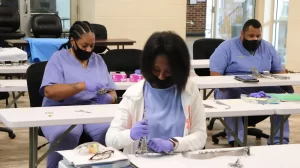Undoubtedly, we live in a society that places high value on college degrees. People chase professional career paths and white-collar jobs. They still consider high school diplomas, vocational colleges, and blue-collar work to indicate lower status. This perspective limits our future leaders, our students, and our society. Not everyone is curious about or good at traditional school subjects like biology, math, and history. There are various types of intelligence. If an aspirant is keen to get into vocational colleges, he should make a future in skilled trades.
Why Vocational Education Is The Best Option
The manufacturing sector is developing and modernizing, making challenging and highly skilled jobs. Many of those jobs are counted in the 30 million jobs within the United States. The pay of these jobs is around $55,000 per year and does not demand a bachelor’s degree. For many individuals, vocational education could be an inexpensive, more flexible, and faster way to an ongoing and successful career path. Let’s find out why vocational education is considered to be the best
You must know what you want to achieve. Going to the vocational school will help the best. Vocational schools present various programs to gain a diploma or certificate that can get you started in your career. You need not worry about complicated admission procedures like traditional colleges.
Most trade programs have close connections with top professionals and employers. This implies that most trade schools model their curriculum based on the skill requirements of the current job market. Furthermore, many of these programs are connected with apprenticeships or workshops.
Vocational schools have different campuses and online classroom options. In addition, many vocational schools allow you to learn when and where you want.
Apply what you understand to real-world working situations. Many vocational schools merge classroom learning with hands-on experience. It is better to apply each and every learning in the trade industry.
Technical vocational schools prepare a straightforward curriculum to train you for entry-level employment in your career. Some programs take as many as six months, while others can go up to one to two years for an associate degree. It is significantly quicker than traditional four-year universities.

Vocational training is the instructional program that equips you for an occupation requiring specialized skills. It may implicate imparting hands-on training, classroom instructions, or a combination of both.
Real vocational training is imparted beyond the formal education system, often leading to a certification or a diploma. You may even undergo vocational training directly as a trainee or an apprentice with or without any formal qualification.
Vocational training directs your career as a solar panel installer, HVAC technician, or welder. Not only this, but it also has many prerequisites when compared to college.
Vocational training programs can be as short as five months and can long up to two years. When compared with traditional education, it comparatively takes very less time to earn a bachelor’s degree.
Vocational training ad programs are less expensive than a university: $4,000 to $15,000 per year versus $28,100 a year for four-year institutions. Thus, it is better to consider the cost twice before investing in them.
Many people do not understand a classroom hearing a teacher lecture on theories and concepts all day. They rather prefer hands-on training presented at a vocational school could be a better fit.
One nice thing about trade school degrees is that they can lead to careers with great potential. The Bureau of Labor Statistics forecasts jobs for HVAC technicians are booming at a rate of 17 percent through 2029. Some college grads end up working jobs that don’t demand a degree.
Neither the vocational college nor technician schools guarantee jobs. But college can be a more predominant investment. Some types of degrees can be applied in the working world better than others.

Indeed hands-on learning in a lab is not the single way to pursue the skills you will require when working in the trades. Certainly, Philadelphia technical college might also have an online learning segment and let you practice what you locate in your own time.
Many students who have taken such courses live a wealthy and fulfilling life in cities, including Allegheny West, Overbook Park, Woodland Avenue, Mill Creek, and Ogontz avenue. Once you bag an outstanding senior-level position in such industries after years of experience, you can relish the competitive benefits!
You can receive hands-on career training at Philadelphia Technician Training Institute for numerous trades in as little as one year. This vocational school will instruct you in your chosen skilled trade very well.
Read More:-